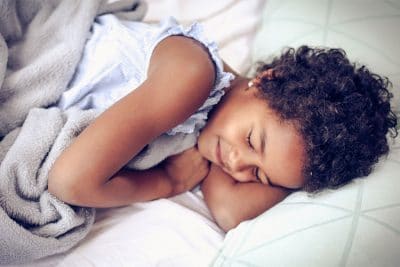Most people have heard of sleep apnea in adults but rarely do people consider the disorder affects children too. Nearly 15% of children suffer from sleep apnea but 90% go undiagnosed. Many parents don’t know about sleep-disordered breathing in children. It can seriously affect a child’s development and cause irreversible damage that can affect them for the rest of their lives. Not sure whether your child might suffer from sleep-disordered breathing? Learn the warning signs of sleep-disordered breathing in children below.

Bedwetting
Nearly one in six children wet the bed between ages 4 and 12. Bedwetting usually isn’t a sign that your child wasn’t potty trained correctly. Instead, it’s a sign that something is wrong. Some of the causes of bedwetting include genetics, sleep disturbance, stress or life changes, medical conditions such as UTI or type 1 diabetes, and slow development of bladder control.
Sleep-disordered breathing falls into the sleep disturbance category. When your child is unable to breathe properly during sleep, they aren’t sleeping well. Poor sleep quality results in sleep deprivation. As the child becomes more sleep-deprived, their brain will try to focus on staying asleep as much as possible. This means that if the child needs to go to the bathroom, the brain won’t alert the body to wake up to go to the bathroom and they will wet the bed instead. However, bedwetting usually wakes the child up, which defeats the brain’s purpose of trying not to disturb sleep.
Snoring, Pauses in Breathing, Coughing, Snorting, or Choking in Sleep
Another major warning sign of sleep-disordered breathing in children that you should watch for are pauses in breathing that occur during sleep. These pauses might sound like coughing, choking, snorting, and snoring. Each of those sounds means that the air isn’t flowing properly. If the airway becomes too obstructed, the child will stop breathing completely. This is when coughing, snorting and choking noises happen. Those noises are the sound of the body trying to let oxygen in again. These events are known as apneas and can occur up to hundreds of times throughout the night. Your child likely won’t remember waking up to catch their breath because the event happens so quickly. However, these events will make them wake up in the morning feeling like they didn’t sleep a wink.
Sleep Terrors
Another major sign that you might not connect with sleep-disordered breathing in children are night terrors. Night terrors and nightmares are common occurrences with children. However, sleep-disordered breathing can help contribute to night terrors due to the sleep deprivation the child experiences. Children may also experience sleepwalking with untreated sleep-disordered breathing. If your child experiences frequent nightmares and/or sleepwalks, getting them tested for sleep-disordered breathing is a good idea.
Mouth Breathing
If you notice that your child breathes through their mouth during the day and during sleep, this is a clear sign that they’re not able to breathe correctly. Mouth breathing is usually the best way to get oxygen if the airway is obstructed. Although mouth breathing will help your child breathe, it will also lead to development issues as well as oral health concerns.
Behavior Problems
When children aren’t sleeping well, it can have a huge effect on their daytime behavior. They might act cranky and irritable for starters. Your child may also struggle to follow rules, suffer from relationship problems with their peers, and experience emotional symptoms including depression and anxiety. If your child suffers from behavior problems, it’s a good idea to look to see if they’re suffering from any other symptoms that may indicate sleep-disordered breathing.
 Hyperactivity
Hyperactivity
Many children commonly receive a misdiagnosis of ADHD instead of sleep-disordered breathing due to hyperactivity. Sleep-disordered breathing can cause symptoms similar to ADHD like increased hyperactivity, behavioral issues, and impulsivity. When children receive a misdiagnosis for ADHD, they’re not treating the actual health problem and will therefore not improve their quality of sleep.
Napping
If your child comes home from school and feels the need to take a nap, this is a sign they’re not sleeping well. Sleep-disordered breathing causes disruptions to sleep because the child is unable to breathe properly. As a result, the child may experience daytime sleepiness and feel the need to take frequent naps.
Poor School Performance, Difficulty Concentrating, and Learning Problems
Due to the lack of sleep, your child may also have a hard time concentrating, learning, and performing well in school. Sleep deprivation can have a huge effect on the brain’s ability to function optimally.
Weight Gain
The last sign that your child might suffer from sleep-disordered breathing is weight gain. Although weight gain is normal as a child grows, becoming overweight is not. When the body experiences sleep deprivation, it affects the hunger hormones. Your child might crave more starchy and sugary foods and feel hungry more frequently. They may also lack the energy to exercise or play. The combination of these factors can lead to weight gain.
Get Sleep-Disordered Breathing Treatment in Columbus, OH
If you think your child might suffer from sleep-disordered breathing, please contact Firouzian Sleep Wellness. Dr. Firouzian can examine your child and search for potential airway obstructions due to improper facial development or oral posture. If necessary, we can provide myofunctional therapy, and interceptive orthodontics such as Healthy Start to correct these issues and ensure proper development. This will allow your child to breathe correctly during sleep and improve their quality of life. You may also see behavior improvement, school improvement, and more.
Don’t wait. Call (614) 683-4640 to book an appointment for your child today to learn more about sleep-disordered breathing treatments.

